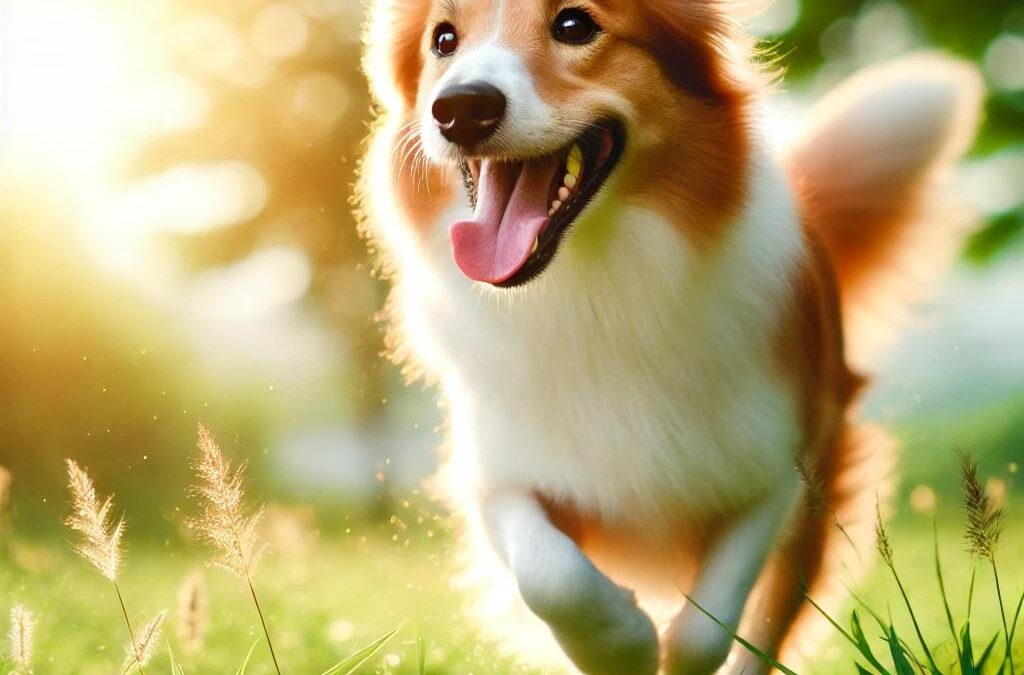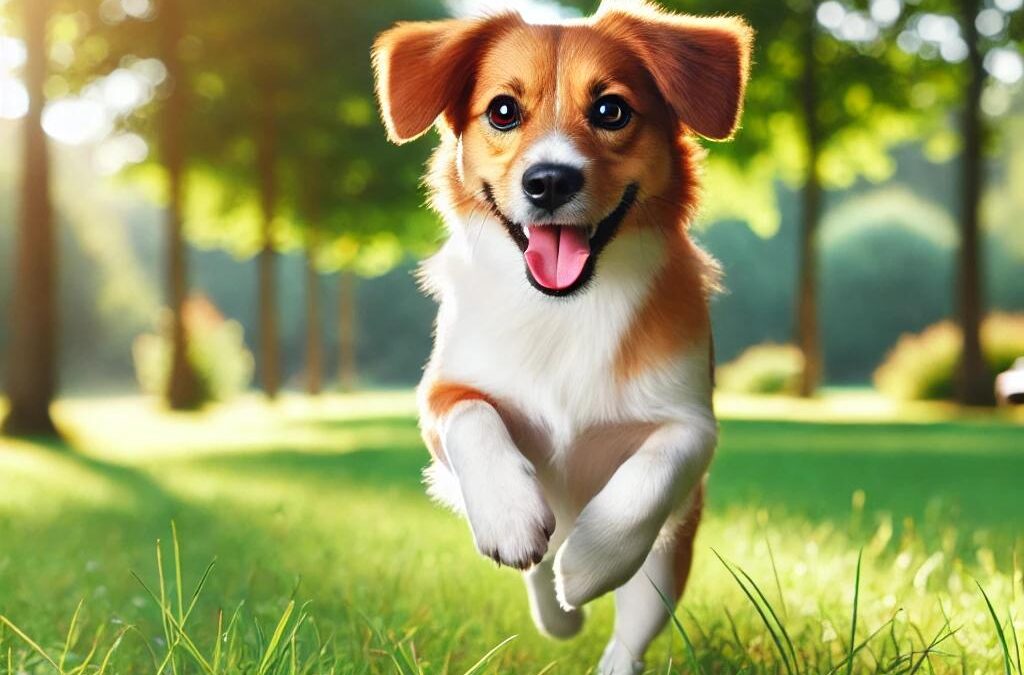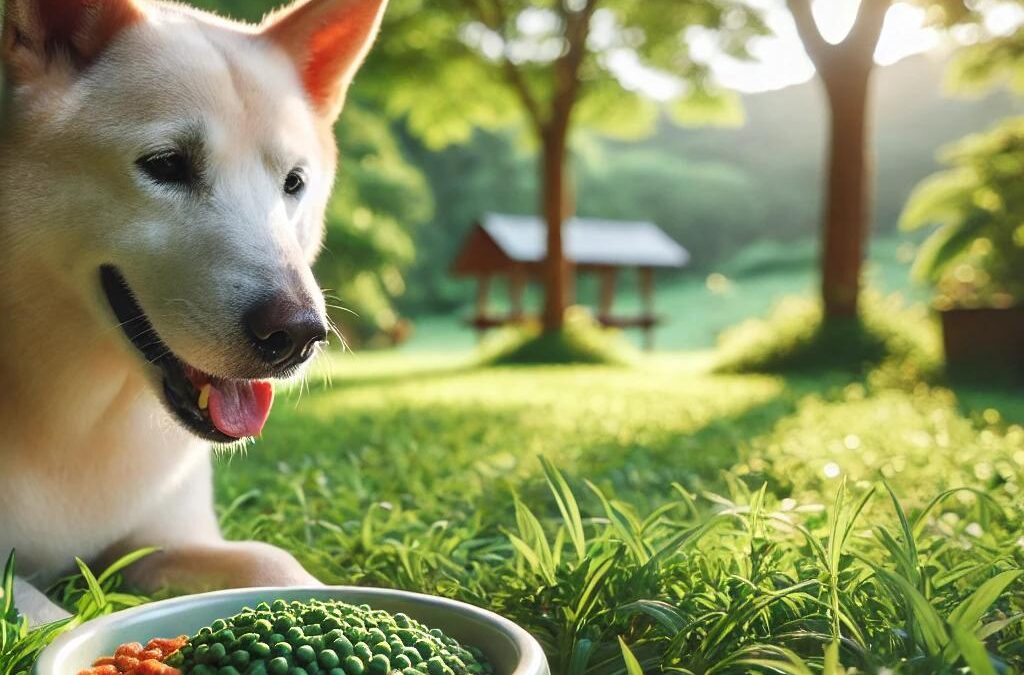
von TCMVET | 15. Oktober 2024 | Ernährungsgesundheit
Verdauungsprobleme bei Hunden, wie z. B. zeitweises Erbrechen, weicher Stuhl und übermäßige Blähungen, sind für viele Tierbesitzer ein häufiges Problem. Diese Probleme können durch eine unausgewogene Ernährung, zugrunde liegende Gesundheitsprobleme oder sogar individuelle Empfindlichkeiten entstehen. Die Identifizierung der Grundursache für die Magen-Darm-Beschwerden Ihres Hundes ist entscheidend für die Verbesserung seiner allgemeinen Gesundheit und seines Wohlbefindens.
Häufige ernährungsbedingte Ursachen für Verdauungsprobleme bei Hunden
- Hoher Fettgehalt
Eine Ernährung mit zu viel Fett kann das Verdauungssystem Ihres Hundes überfordern und zu weichem Stuhl und Erbrechen führen. Fett ist schwerer verdaulich, daher kann es für Hunde mit empfindlichem Magen schwierig sein, es richtig zu verarbeiten. Eine Reduzierung der Fettaufnahme und die Wahl magerer Proteinquellen kann Verdauungsprobleme lindern.
- Unzureichende Ballaststoffe
Ballaststoffe spielen eine entscheidende Rolle bei der Aufrechterhaltung einer gesunden Verdauung, indem sie den regelmäßigen Stuhlgang fördern und die Darmgesundheit unterstützen. Eine ballaststoffarme Ernährung kann zu unregelmäßigem Stuhlgang und Verdauungsbeschwerden führen. Die Zugabe ballaststoffreicher Zutaten wie Kürbis oder Süßkartoffeln kann Linderung verschaffen.
- Nahrungsmittelunverträglichkeiten oder Allergien
Manche Hunde haben Nahrungsmittelempfindlichkeiten oder -unverträglichkeiten, insbesondere gegenüber häufigen Allergenen wie Getreide, Milchprodukten oder bestimmten Proteinen (z. B. Huhn oder Rind). Die Identifizierung der schädlichen Zutat durch eine Eliminationsdiät kann künftigen Verdauungsstörungen vorbeugen.
- Übermäßiges oder schnelles Essen
Hunde, die zu schnell fressen oder große Mengen Futter zu sich nehmen, können Blähungen und Verdauungsstörungen bekommen. Eine Verlangsamung der Mahlzeiten mit Puzzle-Futterautomaten oder kleineren Portionen kann helfen, diese Symptome zu lindern.
Grundlegende Gesundheitsstörungen
Obwohl die Ernährung bei der Verdauung eine wichtige Rolle spielt, können auch andere gesundheitliche Probleme zu Magen-Darm-Beschwerden beitragen. Pankreatitis, bakterielle Überwucherung oder Darmparasiten können chronische Verdauungsprobleme verursachen. Bei anhaltenden Symptomen ist die Konsultation eines Tierarztes zum Ausschluss zugrunde liegender Erkrankungen unerlässlich.
So wählen Sie das beste Futter für einen Hund mit empfindlichem Magen
- Entscheiden Sie sich für leicht verdauliche Zutaten
Wählen Sie Hundefutter, das einfache, hochwertige Zutaten enthält, wie magere Proteine (z. B. Truthahn, Lamm oder Fisch) und Vollkornprodukte wie braunen Reis. Diese sind schonender für den Magen Ihres Hundes und leichter verdaulich.
- Suchen Sie nach Diäten mit begrenzten Inhaltsstoffen (LID)
LID-Hundefutter enthält weniger Zutaten und verringert so das Risiko einer Nahrungsmittelunverträglichkeit oder -allergie. Der Schwerpunkt liegt auf hochwertigem Protein und begrenzten Kohlenhydratquellen und ist daher ideal für Hunde mit empfindlichem Magen.
- Erwägen Sie Probiotika und Präbiotika
Die Zugabe von Probiotika zur Ernährung Ihres Hundes kann helfen, die Darmflora im Gleichgewicht zu halten und eine gesunde Verdauung zu fördern. Präbiotische Ballaststoffe, die in Nahrungsmitteln wie Zichorienwurzeln oder Rübenschnitzeln enthalten sind, unterstützen auch das Wachstum nützlicher Bakterien im Darm.
- Vermeiden Sie künstliche Zusatzstoffe
Vermeiden Sie Hundefutter, das künstliche Konservierungsstoffe, Farbstoffe oder Aromen enthält, da diese Verdauungsprobleme verschlimmern können. Entscheiden Sie sich, wenn möglich, für natürliche, konservierungsmittelfreie Alternativen.
Jeder Hund hat einzigartige Ernährungsbedürfnisse und was für einen Hund funktioniert, ist für einen anderen möglicherweise nicht geeignet. Wenn Sie die häufigsten Ursachen von Verdauungsproblemen verstehen und die Ernährung Ihres Hundes entsprechend umstellen, können Sie seine Verdauungsgesundheit erheblich verbessern. Konsultieren Sie immer einen Tierarzt, bevor Sie größere Ernährungsumstellungen vornehmen, insbesondere wenn Ihr Hund Anzeichen chronischer Verdauungsprobleme zeigt.

von TCMVET | 13. Oktober 2024 | Ernährungsgesundheit
Als Tierbesitzer möchten wir, dass unsere pelzigen Gefährten ein langes, gesundes und glückliches Leben führen. Über die traditionelle tierärztliche Versorgung hinaus greifen viele auf natürliche, ganzheitliche Methoden zurück, um das Wohlbefinden von Haustieren zu fördern. Dieser Ansatz umfasst alles von ausgewogener Ernährung und pflanzlichen Nahrungsergänzungsmitteln bis hin zur Schaffung einer stressfreien Umgebung. In diesem Artikel erkunden wir verschiedene natürliche Möglichkeiten, die Gesundheit Ihres Haustieres zu verbessern, indem wir die Vorteile der Traditionellen Chinesischen Medizin (TCM), natürliche Heilmittel und Änderungen des Lebensstils für einen umfassenden Ansatz zum Wohlbefinden Ihres Haustieres integrieren.
Warum ganzheitliche Gesundheit für Haustiere wichtig ist
Bei der ganzheitlichen Tierpflege wird das gesamte Tier – Körper, Geist und Seele – berücksichtigt, anstatt sich nur auf die Symptome zu konzentrieren. Durch die Kombination natürlicher Heilmittel mit guter Ernährung und regelmäßiger Bewegung können Sie Gesundheitsproblemen vorbeugen, bevor sie auftreten, und die allgemeine Lebensqualität Ihres Haustieres verbessern. Eine ganzheitliche Pflege kann das Immunsystem Ihres Haustieres stärken, das langfristige Wohlbefinden fördern und sogar Stress und Angstzustände reduzieren.
Schlüsselelemente einer natürlichen Haustierpflege
- Natürliche und ausgewogene Ernährung
Die richtige Ernährung ist die Grundlage für ein gesundes Leben Ihres Haustiers. Eine Ernährung, die reich an Vollwertkost, magerem Eiweiß und wichtigen Nährstoffen ist, kann die Energie und das Immunsystem Ihres Haustiers stärken.
- Vollwertkost: Integrieren Sie frisches Gemüse und Obst wie Karotten, Blaubeeren und Süßkartoffeln in die Ernährung Ihres Haustiers.
- Schlanke Proteine: Entscheiden Sie sich für hochwertiges Fleisch wie Huhn, Pute oder Fisch, das die essentiellen Aminosäuren liefert, die für den Muskelerhalt und die allgemeine Vitalität erforderlich sind.
- Gesunde Fette: Integrieren Sie Omega-3- und Omega-6-Fettsäuren aus Fischölen oder Leinsamen, um ein glänzendes Fell, die Gesundheit des Gehirns und die Gelenkfunktion zu unterstützen.
- Pflanzliche Nahrungsergänzungsmittel zur Unterstützung der Gesundheit
Pflanzliche Heilmittel sind eine hervorragende natürliche Möglichkeit, die Gesundheit Ihres Haustiers zu unterstützen. Viele Kräuter, die in der Traditionellen Chinesischen Medizin (TCM) und der westlichen Kräuterkunde verwendet werden, bieten Vorteile wie die Verringerung von Entzündungen, die Stärkung der Immunität und die Beruhigung von Ängsten.
- Kurkuma: Kurkuma ist für seine entzündungshemmenden Eigenschaften bekannt und kann Arthritisschmerzen lindern und die Gesundheit der Gelenke fördern.
- Kamille: Dieses Kraut eignet sich hervorragend zur Linderung von Verdauungsproblemen und zur Beruhigung ängstlicher Haustiere.
- Rehmannia (Di Huang): Dieses in der TCM verwendete Kraut nährt das Blut und unterstützt die Nierengesundheit, weshalb es sich ideal für alternde Haustiere eignet.
- Ingwer: Ingwer ist ein natürliches Kraut gegen Übelkeit, es ist hervorragend für Haustiere mit Magenverstimmung geeignet und kann eine gesunde Verdauung fördern.
- Traditionelle Chinesische Medizin (TCM) für Haustiere
Die Traditionelle Chinesische Medizin bietet einen ganzheitlichen Ansatz zur Gesundheit, indem sie das Qi (Energie) des Körpers ausgleicht und die Harmonie innerhalb des Systems fördert. TCM wird häufig verwendet, um chronische Erkrankungen bei Haustieren zu behandeln und ihre natürliche Heilkraft zu verbessern.
- Szechuan-Liebstöckel (Chuan Xiong): Dieses Kraut fördert die Durchblutung, lindert Schmerzen und Entzündungen, insbesondere bei Haustieren mit Gelenkschmerzen oder Arthritis.
- Geißblatt (Jin Yin Hua): Mit seinen entzündungshemmenden und antimikrobiellen Eigenschaften wird Geißblatt verwendet, um Hitze und Giftstoffe aus dem Körper zu entfernen und Haustieren mit Infektionen oder Hauterkrankungen zu helfen.
- Astragalus (Huang Qi): Astragalus stärkt das Immunsystem, unterstützt die Leber und steigert das Energieniveau. Es wird oft als vorbeugende Maßnahme zur allgemeinen Vitalität eingesetzt.
- Bewegung und geistige Anregung
Regelmäßige körperliche Aktivität ist entscheidend, um Ihr Haustier fit und gesund zu halten. Bewegung fördert die Herz-Kreislauf-Gesundheit, hält den Muskeltonus aufrecht und beugt Fettleibigkeit vor. Aber geistige Anregung ist genauso wichtig – wenn Sie den Geist Ihres Haustieres fit halten, können Sie Langeweile und destruktives Verhalten verhindern.
- Tägliche Spaziergänge: Sorgen Sie dafür, dass Ihr Hund mindestens 30 Minuten am Tag körperlich aktiv ist, um ein gesundes Gewicht und starke Muskeln zu erhalten.
- Interaktives Spielzeug: Stimulieren Sie den Geist Ihres Haustiers mit Puzzlespielzeug oder Trainingsspielen. Katzen mögen Federspielzeug, während Hunde Apportierspielzeug oder Spielzeug zum Ausgeben von Leckerlis bevorzugen.
- Stressabbau und Schaffung einer ruhigen Umgebung
Haustiere sind genauso wie Menschen Stress ausgesetzt. Chronischer Stress kann ihr Immunsystem, ihre Verdauung und ihre allgemeine Stimmung beeinträchtigen. Wenn Sie eine beruhigende Umgebung schaffen und die Angst Ihres Haustiers reduzieren, können Sie seine Gesundheit erheblich verbessern.
- Aromatherapie: Verwenden Sie beruhigende Düfte wie Lavendel oder Kamille, um eine wohltuende Umgebung zu schaffen. Ätherische Öle können helfen, ängstliche Haustiere zu entspannen, aber stellen Sie sicher, dass sie für die Anwendung bei Haustieren unbedenklich sind.
- Routine und Beständigkeit: Haustiere gedeihen mit Routine. Regelmäßige Fütterungs-, Spiel- und Ruhezeiten helfen, Stress abzubauen und vermitteln ein Gefühl der Sicherheit.
- Natürliche Beruhigungsmittel: Natürliche Produkte wie CBD-Öl, Baldrianwurzel oder Notfallmittel können helfen, ängstliche Haustiere zu beruhigen, insbesondere bei stressigen Ereignissen wie Tierarztbesuchen oder Gewittern.
Ganzheitliche Gesundheit für ältere Haustiere
Mit zunehmendem Alter ändern sich die Bedürfnisse von Haustieren. Eine ganzheitliche Pflege kann die Lebensqualität älterer Haustiere erheblich verbessern. Gelenkpräparate, antioxidantienreiche Lebensmittel und Kräuter, die die Nieren- und Leberfunktion unterstützen, können einen großen Unterschied machen.
- Glucosamin und Chondroitin: Diese Ergänzungsmittel helfen, die Gesundheit der Gelenke zu erhalten und Arthritisschmerzen bei alternden Haustieren zu lindern.
- Antioxidantienreiche Lebensmittel: Blaubeeren, Preiselbeeren und Spinat sind voller Antioxidantien, die freie Radikale bekämpfen und das Risiko altersbedingter Erkrankungen verringern.
- Pflanzliche Unterstützung: Kräuter wie rehmannia Und Tragant kann die Nieren und die Leber nähren und stärken, Organe, die im Alter des Haustiers besonders anfällig sind.
Um die Gesundheit Ihres Haustiers auf natürliche Weise zu stärken, ist eine Kombination aus richtiger Ernährung, Bewegung, pflanzlicher Unterstützung und Stressabbau erforderlich. Durch einen ganzheitlichen Ansatz bei der Haustierpflege können Sie dazu beitragen, dass Ihr Hund oder Ihre Katze viele Jahre lang gesund, glücklich und voller Vitalität bleibt. Konsultieren Sie immer Ihren Tierarzt, bevor Sie neue pflanzliche Nahrungsergänzungsmittel einführen oder die Routine Ihres Haustiers ändern, insbesondere bei Haustieren mit Vorerkrankungen.

von TCMVET | 12. Oktober 2024 | Ernährungsgesundheit
Wenn bei einer Katze Krebs diagnostiziert wird, ist die richtige Ernährung ein wesentlicher Bestandteil ihrer Pflege. Katzen sind zwar für ihre wählerischen Essgewohnheiten bekannt, aber eine Ernährung, die auf ihre spezifischen Bedürfnisse während der Krankheit abgestimmt ist, kann einen erheblichen Unterschied bei der Unterstützung ihrer Gesundheit und Verbesserung ihrer Lebensqualität ausmachen. Hier sind einige wichtige Tipps, um sicherzustellen, dass Ihre Katze die Nährstoffe bekommt, die sie während des Kampfes gegen den Krebs braucht.
1. Konzentrieren Sie sich auf hochwertige, leicht verdauliche Proteine
Katzen mit Krebs benötigen hochwertige Proteine, um Muskelmasse und Energieniveau aufrechtzuerhalten. Wählen Sie leicht verdauliche Proteinquellen wie Fisch, Huhn oder Truthahn, die die notwendigen Nährstoffe liefern, ohne das Verdauungssystem zusätzlich zu belasten. Protein hilft Ihrer Katze, stark zu bleiben und die negativen Auswirkungen von Krebs zu bekämpfen.
2. Wenig Kohlenhydrate, viel Fett
Kohlenhydrate können das Wachstum von Krebszellen fördern. Daher sollten Sie die Kohlenhydrataufnahme in der Ernährung Ihrer Katze reduzieren. Konzentrieren Sie sich stattdessen auf gesunde Fette, die Energie liefern und dabei helfen, das Körpergewicht zu halten. Omega-3-Fettsäuren, die in Fischöl enthalten sind, sind besonders nützlich, da sie entzündungshemmende Eigenschaften haben, das Immunsystem unterstützen und Entzündungen reduzieren.
3. Kleine, häufige Mahlzeiten
Bei krebskranken Katzen kann es während der Behandlung zu Appetitlosigkeit oder Übelkeit kommen. Wenn Sie Ihrer Katze häufig kleine Mahlzeiten anbieten, können Sie sie zum Fressen anregen, ohne sie zu überfordern. Wenn sie Schwierigkeiten hat, ihr Interesse am Futter aufrechtzuerhalten, versuchen Sie, es leicht aufzuwärmen, um den Geruch zu verbessern und es ansprechender zu machen.
4. Stärken Sie Ihre Ernährung mit Antioxidantien
Antioxidantien helfen, die Körperzellen vor Schäden zu schützen, was bei der Krebsbehandlung von entscheidender Bedeutung ist. Die Aufnahme antioxidantienreicher Nahrungsmittel wie Beeren oder die Ergänzung mit den Vitaminen C und E kann das Immunsystem Ihrer Katze unterstützen. Konsultieren Sie jedoch immer Ihren Tierarzt, bevor Sie neue Nahrungsmittel oder Nahrungsergänzungsmittel einführen.
5. Flüssigkeitszufuhr ist der Schlüssel
Krebs und seine Behandlungen können zu Dehydrierung führen, daher ist es wichtig, dass Ihre Katze ausreichend Flüssigkeit zu sich nimmt. Nassfutter kann sowohl Flüssigkeit als auch Nährstoffe liefern, und Sie können den Mahlzeiten Ihrer Katze auch natriumarme Brühe beifügen, um die Wasseraufnahme zu fördern. Eine ausreichende Flüssigkeitszufuhr unterstützt die Nierenfunktion und das allgemeine Wohlbefinden.
6. Fragen Sie Ihren Tierarzt nach maßgeschneiderten Nahrungsergänzungsmitteln
Bestimmte Nahrungsergänzungsmittel wie Omega-3-Fettsäuren, Probiotika und Verdauungsenzyme können während der Krebsbehandlung hilfreich sein, um die Gesundheit Ihrer Katze zu unterstützen. Da die Bedürfnisse jeder Katze unterschiedlich sind, ist es wichtig, mit Ihrem Tierarzt zusammenzuarbeiten, um die geeigneten Nahrungsergänzungsmittel und Dosierungen für Ihre Katze zu bestimmen.
7. Überwachen Sie das Gewicht und den Zustand Ihrer Katze
Während der Krebsbehandlung ist es wichtig, das Gewicht und den Körperzustand Ihrer Katze regelmäßig zu überwachen. Katzen können im Kampf gegen die Krankheit schnell Gewicht verlieren, daher ist es wichtig, ihre Ernährung an ihre veränderten Bedürfnisse anzupassen. Wenn Gewichtsverlust zum Problem wird, empfiehlt Ihr Tierarzt möglicherweise spezielle kalorienreiche Nahrungsmittel oder Nahrungsergänzungsmittel, um zu helfen.
Die Pflege einer Katze mit Krebs erfordert viel Liebe zum Detail bei der Ernährung. Die Konzentration auf hochwertige Proteine, die Minimierung von Kohlenhydraten und die Einbeziehung gesunder Fette und Antioxidantien können einen großen Unterschied bei der Unterstützung der allgemeinen Gesundheit Ihrer Katze ausmachen. Konsultieren Sie immer Ihren Tierarzt, um einen individuellen Ernährungsplan zu erstellen, der die individuellen Bedürfnisse Ihrer Katze berücksichtigt und ihr hilft, während der Behandlung so gesund und wohl wie möglich zu bleiben.

von TCMVET | 12. Oktober 2024 | Ernährungsgesundheit
Viele Katzen und Hunde leiden unter Angst und Stress, wenn sie lauten Geräuschen, Stürmen, fremden Menschen oder anderen Tieren ausgesetzt sind. Als Tierbesitzer kann es beunruhigend sein, sein geliebtes Haustier in einem solchen Zustand zu sehen, aber die gute Nachricht ist, dass es natürliche und sichere Lösungen gibt, um die Angst zu lindern. Von Trainingstechniken bis hin zu homöopathischen Mitteln gibt es verschiedene Möglichkeiten, Ihr ängstliches Haustier zu unterstützen.
1. Gehorsamkeitstraining und Bewegung
Eine der effektivsten Möglichkeiten, die Angst Ihres Haustiers zu bewältigen, ist Gehorsamkeitstraining und regelmäßige Bewegung. Training hilft, Struktur zu schaffen, die Stress abbauen kann, indem sie Ihrem Haustier ein Gefühl der Sicherheit vermittelt. Darüber hinaus setzt körperliche Aktivität Endorphine frei, die Ruhe fördern und nervöse Energie reduzieren.
2. Fokussieren Sie Spielzeug und Kistentraining
Interaktive Spielzeuge und Puzzles können Ihr Haustier von seiner Angst ablenken, indem sie es geistig beschäftigen. Das Training mit einer Hundebox bietet Ihrem Haustier auch einen sicheren Rückzugsort in Stresssituationen wie Gewittern oder wenn Gäste zu Besuch kommen. Eine Hundebox vermittelt ein Gefühl der Sicherheit und hilft Ihrem Haustier, sich weniger schutzlos zu fühlen.
3. Tonfall
Die Art und Weise, wie Sie mit Ihrem Haustier umgehen, spielt eine wichtige Rolle bei der Beruhigung. Ein beruhigender, ruhiger Tonfall kann Ihrem Haustier die Gewissheit geben, dass alles unter Kontrolle ist. Vermeiden Sie es, Ihre Stimme zu erheben oder selbst ängstlich zu wirken, da Haustiere sehr empfindlich auf menschliche Emotionen reagieren.
4. Homöopathische Heilmittel
Homöopathische Mittel sind eine sanfte, natürliche Methode, um die Angst Ihres Haustiers zu lindern. Diese Mittel können bedenkenlos täglich angewendet werden, um allgemeine Angstzustände zu behandeln, und können bei Stresssituationen in höheren Dosen verabreicht werden. Die Verabreichung von Homöopathie vor einer Stresssituation, wie einem Tierarztbesuch oder Feuerwerk, kann besonders wirksam sein, da es schwierig sein kann, Ihr Haustier zu beruhigen, wenn der Stress erst einmal eingesetzt hat.
5. Blütenessenzen
Blütenessenzen wirken auf emotionaler Ebene und sind äußerst wirksam bei der Reduzierung von Stress und Angst bei Haustieren. Diese Formeln enthalten die energetische Essenz von Blumen, die Emotionen beruhigen kann. Haustiere reagieren besonders empfänglich auf diese energiebasierten Behandlungen und Blütenessenzen sind sowohl mild als auch sicher für die Langzeitanwendung.
6. Kräuterformeln
Pflanzliche Heilmittel wirken zwar langsamer als Homöopathie oder Blütenessenzen, bieten aber lang anhaltende Vorteile. Pflanzliche Nahrungsergänzungsmittel können täglich eingenommen werden, um Stress und Angstzustände auf natürliche Weise mit der Zeit abzubauen und ein Gefühl der Ruhe zu fördern.
7. Thundershirt: Eine einzigartige Lösung
Das Thundershirt ist eine kreative und bewährte Lösung für ängstliche Haustiere. Dieses eng anliegende Hemd übt sanften Druck aus, ähnlich wie beim Wickeln eines Babys, wodurch sich Haustiere sicher und geborgen fühlen. Es ist besonders hilfreich bei Gewittern, Feuerwerk oder anderen angstauslösenden Ereignissen.
Ob durch Training, natürliche Heilmittel oder einzigartige Hilfsmittel wie das Thundershirt – es gibt viele sichere und wirksame Möglichkeiten, die Angst Ihres Haustiers zu lindern. Indem Sie proaktiv vorgehen und eine unterstützende Umgebung schaffen, können Sie Ihrer Katze oder Ihrem Hund helfen, sich in Stresssituationen ruhiger und sicherer zu fühlen.

von TCMVET | 12. Oktober 2024 | Ernährungsgesundheit
Ein gesundes Herz ist für das allgemeine Wohlbefinden Ihres Haustiers von entscheidender Bedeutung. Das Herz arbeitet unermüdlich und schlägt durchschnittlich etwa 100 Mal pro Minute. Es sorgt dafür, dass Sauerstoff, Nährstoffe, Hormone und lebenswichtige Zellen durch den Körper zirkulieren. Angesichts dieser lebenswichtigen Funktion ist es für Tierbesitzer wichtig, die Herzgesundheit ihres Tieres durch richtige Ernährung und regelmäßige Bewegung zu unterstützen.
1. Regelmäßige Bewegung: Das Herz stark halten
Bewegung dient nicht nur der Gewichtserhaltung Ihres Haustiers, sondern ist auch für die Herz-Kreislauf-Gesundheit unerlässlich. Regelmäßige körperliche Aktivität stärkt den Herzmuskel, hilft bei der Regulierung des Blutdrucks und hält den Kreislauf in Schwung. Ob täglicher Spaziergang mit Ihrem Hund oder interaktive Spieleinheiten mit Ihrer Katze – Bewegung hält das Herz und den Körper Ihres Haustiers stark und gesund.
2. Herzgesunde Ernährung: Der Schlüssel zur Langlebigkeit
Die Ernährung Ihres Haustiers ist einer der wichtigsten Faktoren für die Herzgesundheit. Eine Ernährung, die reich an Vitaminen, Nährstoffen und Proteinen ist, hilft Ihrem Haustier, ein gesundes Körpergewicht zu halten, Entzündungen zu reduzieren und die Herzfunktion zu unterstützen. Füttern Sie Ihr Haustier nicht mit Futter, das Mais, Weizen oder Soja enthält, da diese häufige Allergene bei Katzen und Hunden sind. In der freien Natur würde Ihr Haustier diese Getreidesorten nie fressen und viele Haustiere reagieren allergisch, was zu Verdauungsproblemen wie Erbrechen oder Durchfall führt.
Darüber hinaus reagieren viele Haustiere allergisch auf Proteine wie Huhn, Truthahn und Ente. Diese Allergien können auch zu Magen-Darm-Problemen und Entzündungen führen, die sich negativ auf die Herzgesundheit auswirken können. Entscheiden Sie sich für hochwertige, artgerechte Proteinquellen, die weniger wahrscheinlich allergische Reaktionen hervorrufen, und sprechen Sie mit Ihrem Tierarzt über die besten Ernährungsoptionen.
3. Vermeiden Sie häufige Allergene: Mais, Weizen, Soja und bestimmte Proteine
Als verantwortungsbewusster Tierhalter ist es wichtig, die Etiketten des Futters Ihres Haustiers sorgfältig zu lesen. Getreidebasierte Füllstoffe wie Mais, Weizen und Soja bieten wenig Nährwert und sind häufige Allergene bei Haustieren. Darüber hinaus enthalten viele verarbeitete Tierfutter Geflügelnebenprodukte, die bei manchen Tieren allergische Reaktionen auslösen können. Der Verzicht auf diese Zutaten aus der Ernährung Ihres Haustiers kann Entzündungen lindern, die Verdauung verbessern und die allgemeine Herzgesundheit unterstützen.
4. Nahrungsergänzungsmittel für die Herzgesundheit
Zusätzlich zu einer ausgewogenen Ernährung sollten Sie Ihrem Haustier herzunterstützende Nahrungsergänzungsmittel geben. Omega-3-Fettsäuren, die in Fischöl enthalten sind, sind dafür bekannt, Entzündungen zu reduzieren und die Herz-Kreislauf-Funktion zu unterstützen. Taurin, eine Aminosäure, ist besonders wichtig für Katzen, da es die ordnungsgemäße Funktion des Herzmuskels unterstützt. Konsultieren Sie immer Ihren Tierarzt, bevor Sie der Ernährung Ihres Haustiers Nahrungsergänzungsmittel hinzufügen, um sicherzustellen, dass es die richtigen Nährstoffe in den richtigen Mengen erhält.
Indem Sie Ihrem Haustier regelmäßig Bewegung, eine ausgewogene Ernährung ohne häufige Allergene und geeignete Nahrungsergänzungsmittel bieten, können Sie die Herzgesundheit Ihres Haustiers unterstützen und ihm ein langes, gesundes Leben ermöglichen. Denken Sie daran, dass das Herz Ihres Haustiers jeden Tag hart arbeitet – es liegt an Ihnen, ihm die Nährstoffe und die körperliche Unterstützung zu geben, die es braucht.

von TCMVET | 11. Oktober 2024 | Ernährungsgesundheit
Wenn bei einem Hund Krebs diagnostiziert wird, wird die Aufrechterhaltung eines gesunden Gewichts zu einem wichtigen Teil seines gesamten Behandlungsplans. Krebs kann aufgrund von Faktoren wie Appetitlosigkeit, Muskelschwund und erhöhtem Stoffwechselbedarf des Körpers häufig zu Gewichtsverlust führen. Wenn Sie dafür sorgen, dass Ihr Hund sein Gewicht hält oder zunimmt, kann dies seine Lebensqualität verbessern, seine Immunfunktion stärken und die Wirksamkeit von Krebsbehandlungen unterstützen. In diesem Artikel untersuchen wir praktische Strategien, die krebskranken Hunden helfen, an Gewicht zuzunehmen und es zu halten.
Gewichtsverlust bei krebskranken Hunden verstehen
Gewichtsverlust bei krebskranken Hunden kann auf mehrere Faktoren zurückgeführt werden:
- Appetitverlust: Krebsbehandlungen wie Chemotherapie und Bestrahlung können Übelkeit verursachen und den Appetit eines Hundes verringern.
- Krebskachexie: Dieser Zustand führt zu Muskel- und Fettabbau, selbst wenn ein Hund genügend Kalorien zu sich nimmt. Kachexie wird durch die Stoffwechselveränderungen verursacht, die Krebs im Körper auslöst.
- Erhöhter Kalorienbedarf: Während der Kampf gegen den Krebs verbrennt der Körper oft mehr Kalorien, was es für Hunde schwierig macht, ihr Gewicht zu halten.
Angesichts dieser Herausforderungen kann die richtige Ernährung und Pflege einen erheblichen Unterschied für die Gesundheit und Genesung Ihres Hundes bedeuten.
Effektive Strategien zur Gewichtszunahme bei krebskranken Hunden
- Hochwertige, kalorienreiche Ernährung Eine der effektivsten Möglichkeiten, die Gewichtszunahme zu fördern, besteht darin, Ihrem Hund eine kalorienreiche, nährstoffreiche Ernährung anzubieten. Konzentrieren Sie sich auf die Fütterung:
- Proteinreiche Lebensmittel: Protein ist wichtig für den Erhalt der Muskelmasse, die durch Krebs schnell abgebaut werden kann. Wählen Sie mageres Fleisch wie Huhn, Pute oder Fisch sowie proteinreiche Eier.
- Gesunde Fette: Fette sind eine konzentrierte Kalorienquelle. Omega-3-Fettsäuren, die in Fischöl oder Leinsamenöl enthalten sind, sind besonders vorteilhaft für Hunde mit Krebs, da sie Entzündungen reduzieren und die Immungesundheit unterstützen können.
- Komplexe Kohlenhydrate: Obwohl krebskranken Hunden weniger Kohlenhydrate guttun, da Krebszellen oft von Zucker leben, können niedrig glykämische Optionen wie Süßkartoffeln und brauner Reis Energie liefern, ohne den Blutzuckerspiegel in die Höhe zu treiben.
- Häufige, kleine Mahlzeiten Hunde, die sich einer Krebsbehandlung unterziehen, haben oft weniger Appetit. Wenn Sie ihnen kleinere, häufigere Mahlzeiten anbieten, können Sie sie dazu anregen, im Laufe des Tages mehr zu fressen. Überfordern Sie Ihren Hund nicht mit großen Portionen und achten Sie stattdessen auf Konsistenz und Qualität der angebotenen Mahlzeiten.
- Nahrungsergänzungsmittel zur Gewichtszunahme Erwägen Sie, dem Futter Ihres Hundes Gewichtszunahme-Ergänzungsmittel beizufügen. Diese können eine konzentrierte Quelle an Kalorien und wichtigen Nährstoffen zur Unterstützung der Muskelmasse sein. Ihr Tierarzt kann Produkte wie diese empfehlen:
- Nutri-Cal: Ein kalorienreiches Nahrungsergänzungsmittel zur Steigerung der Energie und Förderung der Gewichtszunahme.
- Fischöl: Es ist reich an Omega-3-Fettsäuren, hilft bei der Aufrechterhaltung eines gesunden Gewichts und reduziert Entzündungen.
- Probiotika: Die Unterstützung der Darmgesundheit kann die Verdauung und Nährstoffaufnahme verbessern, sodass Ihr Hund leichter an Gewicht zunimmt.
- Appetite Stimulants Wenn Ihr Hund Appetitlosigkeit verspürt, fragen Sie Ihren Tierarzt nach der Möglichkeit, Appetitanreger einzusetzen. Medikamente wie Mirtazapin oder Entyce kann verschrieben werden, um Ihren Hund zu mehr Fressen zu animieren und so ungewollten Gewichtsverlust während der Behandlung zu verhindern.
- Hausgemachte Nährstoff-Boosts Manche Hundebesitzer haben Erfolg mit selbstgemachten Mahlzeiten, die sowohl kalorienreich als auch schmackhaft für ihre Hunde sind. Hier sind ein paar Ideen, um den Appetit Ihres Hundes anzuregen und ihm gleichzeitig die Nährstoffe zu geben, die er braucht:
- Gekochtes Huhn oder Truthahn: Um den Geschmack zu verbessern, fügen Sie etwas Hühnerbrühe hinzu.
- Eier: Rührei oder leicht gekochte Eier sind eine großartige Proteinquelle.
- Kürbis oder Süßkartoffeln: Leicht verdaulich und voller Nährstoffe.
- Hüttenkäse oder Naturjoghurt: Proteinreich und magenschonend.
- Medikamente gegen Übelkeit Krebsbehandlungen können oft Übelkeit verursachen, die Hunde vom Fressen abhält. Medikamente gegen Übelkeit wie Cerenia kann helfen, Übelkeit und Erbrechen zu kontrollieren und Hunde dazu zu animieren, mehr zu fressen und ihren Appetit wiederzuerlangen.
- Stress minimieren Stress kann den Appetit eines Hundes verringern. Daher ist es wichtig, eine ruhige, angenehme Umgebung für Ihr Haustier zu schaffen. Sorgen Sie für einen ruhigen Ort, an dem Ihr Hund ungestört fressen und sich sicher fühlen kann. Erwägen Sie sanfte Aktivitäten, Massagen oder verbringen Sie wertvolle Zeit mit Ihrem Haustier, um seine Angst zu verringern, was sich auch positiv auf seinen Appetit auswirken kann.
Überwachen Sie das Gewicht und die Fortschritte Ihres Hundes
Es ist wichtig, das Gewicht und den Körperzustand Ihres Hundes regelmäßig zu überwachen. Wiegen Sie ihn wöchentlich, um den Fortschritt zu verfolgen, und konsultieren Sie Ihren Tierarzt, wenn er trotz Ihrer Bemühungen weiterhin Gewicht verliert. Behalten Sie außerdem sein Energieniveau, seinen Appetit und seine allgemeine Stimmung im Auge, da diese Indikatoren dafür sein können, wie gut Ihre gewählten Strategien funktionieren.
Ihr Tierarzt empfiehlt möglicherweise auch regelmäßige Blutuntersuchungen, um sicherzustellen, dass Ihr Hund ausreichend ernährt wird und dass die Krebsbehandlung seine Fähigkeit, ein gesundes Gewicht zu halten, nicht beeinträchtigt.
Einem krebskranken Hund dabei zu helfen, sein Gewicht zu halten oder zuzunehmen, ist ein wichtiger Teil seines gesamten Behandlungsplans. Indem Sie auf hochwertige Ernährung achten, kleinere, häufigere Mahlzeiten anbieten und bei Bedarf Appetitanreger oder Nahrungsergänzungsmittel verwenden, können Sie die Gewichtszunahme Ihres Hundes unterstützen. Arbeiten Sie immer eng mit Ihrem Tierarzt zusammen, um einen maßgeschneiderten Ernährungsplan zu erstellen, der den spezifischen Bedürfnissen Ihres Hundes während der Krebsbehandlung entspricht.







